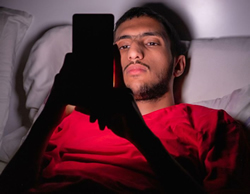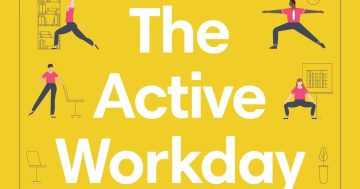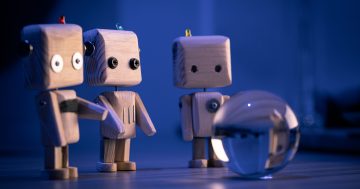Arianna Huffington* says that while our increased relationship with technology is getting us through the pandemic, there will be a need for a ‘Great Recalibration’ afterwards.
 We’ve had so many ‘new normals’ to deal with over the past 18 months.
We’ve had so many ‘new normals’ to deal with over the past 18 months.
However, the most important thing about the new ‘new normal’ we’re transitioning to now is to make sure we leave behind the pre-pandemic ways of working and living.
A big part of that should be recalibrating our relationship with technology, including discontinuing activities and habits we picked up during the pandemic that leave us drained and depleted.
Like living our entire lives online.
Even before the pandemic, our relationship with technology was a constant battle — one that had to be fought every day.
Once the pandemic hit, that relationship became even more out of balance.
According to one study, by the middle of 2020, the average adult was spending over 16 hours a day with digital media.
Netflix had added nearly 16 million subscribers; Zoom sales jumped 369 per cent.
Much of this was necessary. It allowed millions of people all over the world, including me, to work at home.
It allowed us to stay connected with family and loved ones. It allowed students to not lose an entire year of instruction. It was also an escape.
As welcome as it was to be able to connect, that dependence came at a high cost.
The word doomscrolling’ was added to our lexicon. As was the word ‘Coronasomnia’.
A recent study in the journal Sleep found that there was a “strong relationship” between using devices at night and sleep disturbances during the pandemic-driven lockdowns.
The lessons are obviously relevant for the post-pandemic future.
As one of the study authors put it: “Our findings certainly can be generalised to the future, as technologies will find more and more space in our daily routine.”
Our screen saturation has been even more troubling for our children.
Another study found that during the pandemic, time spent online by children shot up nearly 500 per cent. Obesity rates among children also went up.
And as Technology Correspondent, Kim Hart recently wrote in Axios, putting that digital genie back in the bottle is not going to be easy.
“Like many parents, I’m embarrassed to admit how much screen time my kids have become accustomed to over the past year,” she writes.
“Getting them to shut off the tablets ends up in an epic power struggle.”
Robyn Mehlenbeck from George Mason University says brains change when you’re spending time online.
“We’re going to see some social skill deficits across the board as people are emerging from the pandemic,” she says.
What’s clear is that as we emerge from the pandemic, we need to also shed many of our digital habits.
Writing in The Atlantic magazine, Kaitlyn Tiffany wonders about whether what she calls a ‘Great Offlining’ is in the offing.
“It’s getting easier to imagine that we’re on the brink of something big: A coordinated withdrawal from swiping and streaming, a new consensus that staying home to watch Netflix is no longer a chill Friday-night plan,” she writes.
Creating a new, and more healthy, relationship with technology is not going to be easy.
The online world hits us like a drug, but it doesn’t truly meet our deep-seated, hard-wired need for connection.
It’s safe to say that most of us take a lot less for granted now than we did before the pandemic.
Like real, in-person social connection, and having the time and space in our daily lives to connect with ourselves, which is a form of connection that’s just as essential.
There’s a collective longing to not go back to living in our pre-pandemic shallows.
We’ve learned some hard-won lessons about what really matters to us, and what was just noise, feeding us a junk food version of connection, but one that doesn’t meet the requirements to keep us healthy.
I love technology. I’ve started two very tech-centric companies, but ultimately, technology is just a tool, one which can add to our lives, or deplete and diminish them.
Much like a hammer — a very useful tool, but not if you hit yourself in the head with it, which produces roughly the same cognitive effect as doomscrolling.
Of course, the pandemic isn’t over yet.
Our lives are still being disrupted and there is huge uncertainty about what the next year will look like.
That’s also why this is the perfect moment to take some time to audit our relationship with technology.
Is it serving us? Are the ways in which we were using it, however necessary they may have been at the time, still necessary?
The relationship we had with technology before the pandemic, or during the pandemic, doesn’t have to be the one we emerge with.
So let the Great Recalibration begin.
*Arianna Huffington is the Founder and Chief Executive of Thrive Global; the Founder of The Huffington Post, and the author of 15 books, including, most recently, Thrive and The Sleep Revolution.
She can be contacted through the Thrive Global website.











